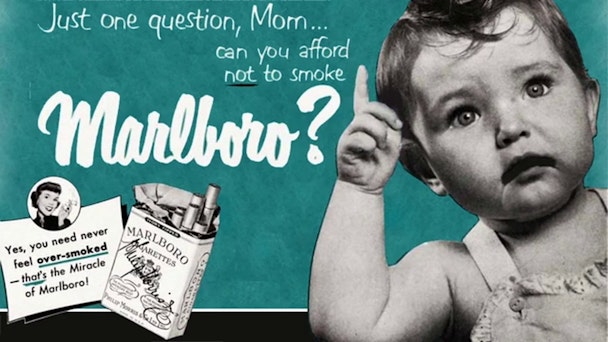Good parenting as a model for good advertising
The Mad Men of the 50s and 60s treated consumers rather like authoritarian parents. Their brash message was – ‘we know what you really need deep down – though you didn’t even know it yourself’.

Good parenting could be the way forward for advertisers says The School of Life
They revealed to us how deep our longing was for liberty, for example, or at least to be seen as a free spirit. They then showed us how cigarettes, single malt whisky, or foldaway ironing boards were the ideal ways to express that.
They expected us to do as we were told, if told with enough authority. And, by and large, we did.
The problem was that the things they encouraged us to do were not always terribly good for us. We began to wonder whether weaning infants on fizzy pop or curing our chesty cough by chain smoking a pack of Camels were the best moves.
Since the mid 90s, roughly corresponding to the rise of the internet, attitudes have shifted slowly but surely in the other direction.
It’s no longer fashionable to be seen as too obviously in charge. Brands wear their influence over us far more lightly. Bespoke suits have been replaced with bespoke T-shirts. Don Draper has long been consigned to the disciplinary committee.
Yesterday’s slow emoting Mad Men have been replaced with a new generation of slightly sad men who have rejected the role of the authoritarian parent. Instead, they have adopted the guise of the overly indulgent parent.
The message from every focus group and relentless digital feedback request couldn’t be more different from the voice of Don Draper. It says, ‘we are listening and will give you whatever you want, we don’t have all the answers, you’re in charge after all, not us’. It’s almost impossible to open a corporate website now without being instantly harangued to fill in a survey on how the company could possibly do better.
It’s like walking into a party and having the host immediately collar you about whether you think they’ve arranged the nuts neatly enough.
In a strange Trotskyite-branded version of capitalism, some companies have even gone as far as to claim that their companies are in reality ours anyway. The classic ‘It’s Your M&S’ tagline from a few years ago led the charge. Barclays similarly assures us that it’s ‘our bank’ – though given the level of government bailouts across the financial sector, it’s a strapline that could have been adopted by many others. This move has now been supplemented with ads telling us that if we buy their burgers, cars or confectionary, we’ll be enriching their shareholders ‘like a boss’.
But the shift is most clearly evident in the plethora of open source, or user generated campaigns. As a result, we’ve ended up with research vessels called Boaty McBoatface and Gary Lineker selling crisps by holding up pictures of Harold Shipman. Campaigns are deliberately left half finished, until the more narcissistic among us step up to fill in the blanks with a photo of our pug in a novelty matador cape.
The premise behind this shift is in fact, however, quite noble. We’ve rightly recognised that it isn’t terribly nice to persuade consumers to do things that aren’t in their best interests. And we’re right to acknowledge the virtues of self-expression. To an extent.
The problem is that the results are so often prone to mockery. When children sense that their parents lack the confidence of their convictions, they are quick to test the boundaries. In a similar sense, ‘puerile’ consumers who sense there are no adults confidently taking charge of these campaigns, are quick to lampoon.
The implicit deal between the ad world and the consumer used to be that advertisers would launch ads at us loaded with as many subliminal psychological depth charges as they could muster. We could give in or heroically resist ‘the man’ – feeling some sense of pride at having seen through their schtick. Now, we’re expected to collaborate – seeing ourselves as much as ‘the man’ as anyone else.
There are, of course, still plenty of campaigns that move us deeply.
But they are not the ones that best facilitate us putting forward our own views. They express ideas that we want to get behind. We are moved to wear poppies on Remembrance Sunday for example, because everyone is getting behind the same idea – not trying to put their own unique stamp on the occasion. There's no need for a highly personalised Poppy Day campaign.
While good ideas touch us on a personal level – the level of a customer segment at best – great ideas touch us on a human level. One that we all share. That requires much deeper thinking – the kind of thinking that the Mad Men were so good at, even if their ultimate motives, and the products that they were shifting, were sometimes suspect.
The best brands act more like wise parents. They combine the thoughtful confidence of the Mad Men with genuine concern for promoting our best interests. They are neither arrogantly authoritarian nor obsequiously obliging.
Rather they concentrate on confidently providing us with what we really need – at the deepest and most human level they can get to. It may not seem as fashionable as working it all out together in a big creative scrum. But wise parents are rarely that fashionable.
Nonetheless, we’ll thank them one day.
Ewen Haldane is business director at The School of Life.
Content by The Drum Network member:

The School of Life
The School of Life is a unique team of world leading psychologists, philosophers, artists, designers, poets, sociologists and anthropologists. We are a global organisation...
Find out more